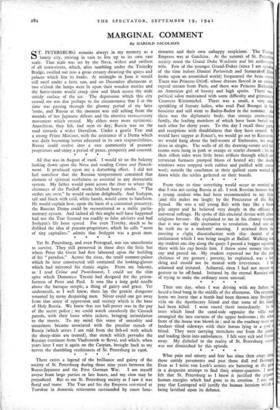All that was in August of 1906. I would sit
on the balcony looking down upon the Neva and reading Crime and Punish- ment. It produced upon me a disturbing effect. I did not feel somehow that the Russian temperament contained that element of spiritual restfulness so essential to any democratic system. My father would point across the river to where the chimneys of the Putiloff works belched heavy smoke. " The strikes are over," he would exclaim delightedly. And Stolypin, tall and black with cold, white hands, would come to luncheon. He would explain how, upon the basis of a contented peasantry, the Russian Duma could be reconstituted as a stable parlia- mentary system. And indeed all this might well have happened had not the Tsar listened too readily to false advisers and had Stolypin's life been spared. For even Trotzky, much as he disliked the idea of peasant-proprietors, which he calls " nests of tiny capitalists," admits that Stolypin was a great man.


























 Previous page
Previous page